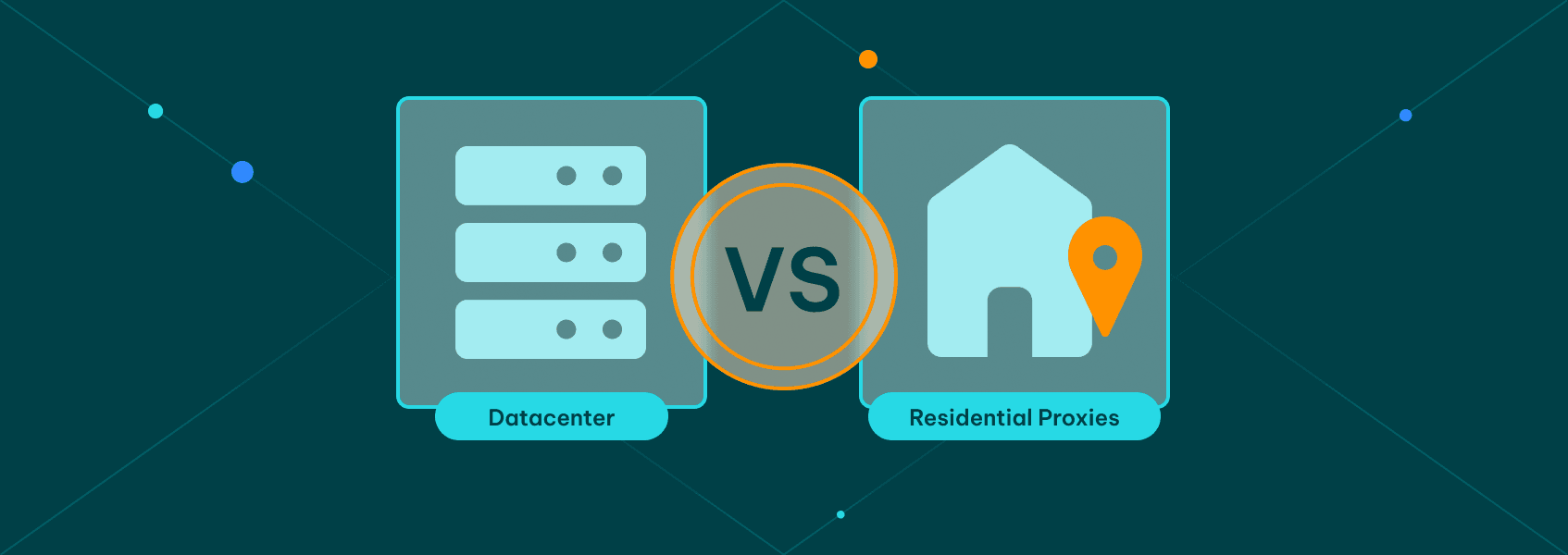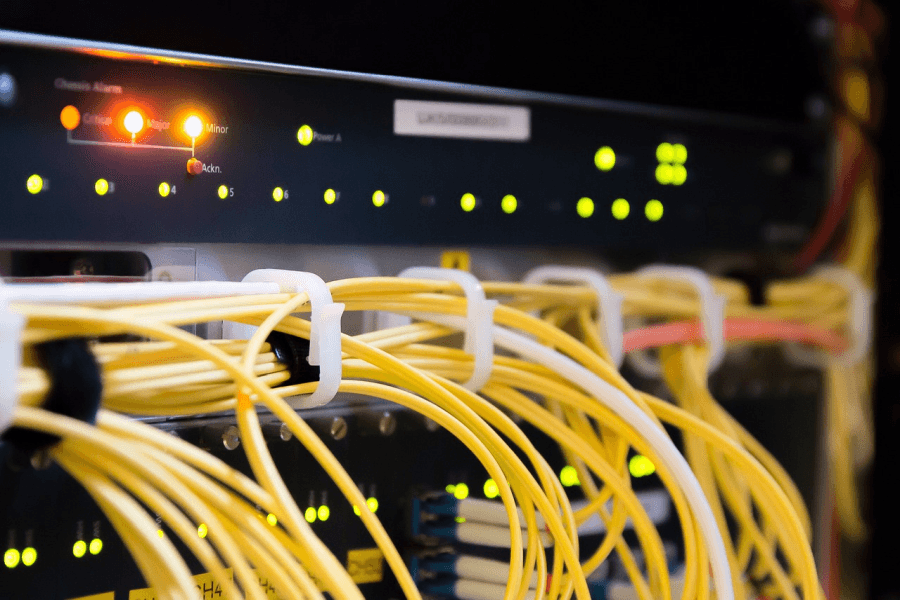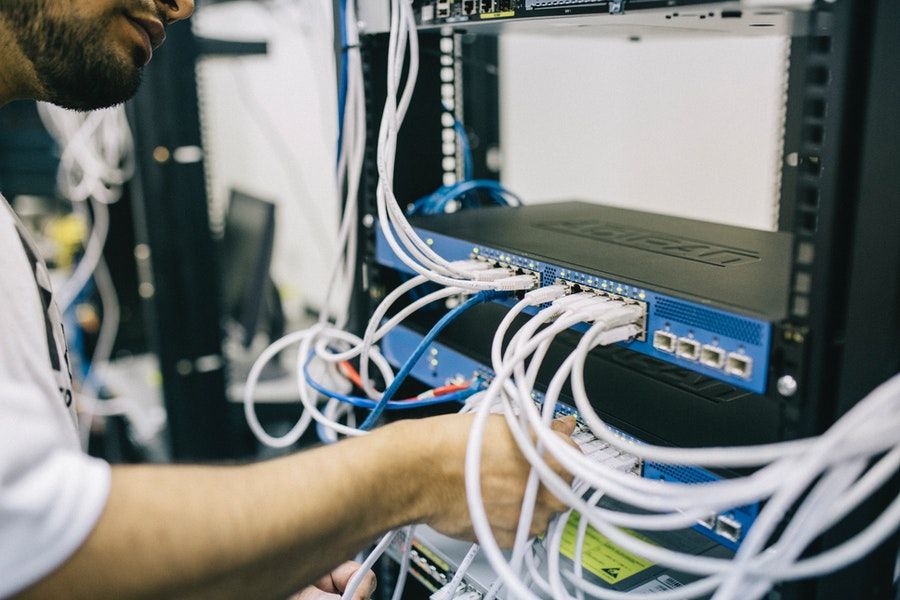Residential vs. Datacenter Proxy: An In-Depth Comparison


Vilius Dumcius
In This Article
Simply put, proxies can transform what you thought was possible about the internet. Though both datacenter and residential proxies hide your actual IP address and keep your online activity private, they also do much more.
Proxies are a gateway for you to access the entire internet freely. If your geographical location limits your access to websites from other countries and regions, proxies will get you around that.
When it comes to choosing between datacenter vs. residential proxies, there are several factors to consider. In this article, we’ll explain what these proxies are and how they differ.
Datacenter vs. Residential Proxies - What Are They?
Proxies keep your online activity, personal information, IP address, browsing history, and other data anonymous and secure. They break digital barriers, circumvent geographical, website, and server blocks, and keep you safe at the same time. Datacenter proxies and residential proxies work in the same way - they mask your IP address, offering security and anonymity. They are two of the essential types of proxies. With this in mind, let’s take a closer look and find the differences between them.
What Is a Datacenter Proxy?
Private datacenter proxies are the most common type of proxy today. They do not have any affiliation to your internet connection or internet service provider and are entirely independent of these two.
Typically, you buy datacenter proxies in bulk from a secondary source giving you an assortment of IP addresses you may use. When you use these proxies, your original IP address is masked and replaced by the IP address issued by your datacenter proxy service provider.
Each proxy will have its unique IP address, providing you with a different online identity each time you connect to the internet. Datacenter proxies allow you to choose your location by giving you different IP addresses to make you appear to be in another place. In this way, these proxies give you the ability to browse from any location in the world.
However, these proxies are usually sourced from cloud service providers and are generally used by multiple users at once. As datacenter proxy IP addresses are not affiliated to internet service providers (ISPs), they have a tendency to be flagged and banned more frequently.
What Is a Residential Proxy ?
When an internet service provider connects your home or office to the internet, they allocate an IP address to the location. It is the actual residential IP address of the particular physical site from which you access the internet. When you change your physical location, your internet service provider gives you a new IP address.
Residential proxies are IP addresses given by an internet service provider (ISP). They are real IP addresses that are attached to actual devices using residential internet connections. A residential proxy allows you to connect to the internet through the IP address of another existing home or office.
It’s important to know that unlike datacenter proxies, residential proxies allow websites and services to trace the IP address back to its actual physical location. In other words, these proxies are indistinguishable from genuine internet users.

Datacenter vs Residential Proxies: Key Differences
In choosing between a datacenter and residential proxy, it comes down to what you need. Datacenter proxies are more readily available and easier to find than residential proxies. They are generally much cheaper, with some proxy service providers charging less than a dollar per IP address. The speed is a fantastic benefit of datacenter proxies as they are not limited by ISP constraints.
Residential proxies are not as fast. Their speed is dependent on the speed of the internet connection of the actual IP location. Additionally, since they are affiliated to an ISP and a real internet connection, residential proxies get around geo-blocking much easier. Since the internet is available in (almost) all corners of the world, residential proxies allow you access to a greater range of IP locations worldwide.
If trust and legitimacy are what you need, then a residential proxy is best for you. Websites trust them because these proxy IPs link to actual residential locations or legitimate ISPs. Certain websites can detect proxy connections by checking if they connect to physical addresses or ISPs.
Datacenter proxies come as blocks in most cases, a series of IP’s whose addresses follow each other sequentially. Because these block datacenter proxies are not attached to a location or a legitimate ISP, and the addresses are in sequence, they are easy to identify and block.
Residential proxies have a significantly lower block rate than datacenter proxies. Because residential proxies use real IP addresses of actual residential places, they make great sneaker proxies . Websites for sneaker retailers like Adidas, Converse, and Nike easily detect datacenter proxies and block them, but residential proxies hardly ever get seen.
Once again, in choosing between datacenter vs. residential proxies, it’s important to remember that both offer you anonymity by masking your IP address. Though residential proxies are more secure and harder to detect, they are slower and more expensive. Datacenter proxies are faster, cheaper, and more accessible, but they’re also easier to detect and block. 
Conclusion
Once you’ve made your choice, it’s important to find a trustworthy proxy service provider. A legitimate, secure, and reliable proxy service provider will offer clean proxies that have not been blacklisted, banned, or flagged for suspicious activity.
At IPRoyal , we offer you the best of both worlds. Our static and rotating residential proxy service allows you to own real IPs in different countries worldwide. We do not splice or share proxies - all our proxies are for your private use alone.
Additionally, we offer our clients the ability to alter and replace your proxy at specific times automatically. Our datacenter proxies are powerful, fast, and safe. Our sneaker proxies are private, compatible with any sneaker bot, and reserved only for you. Finally, our premium private proxies offer IPs from multiple subnetworks for you to choose from and support both HTTPS and SOCKS5 .
Get in touch with us today to find out how we can help your business!

Author
Vilius Dumcius
Product Owner
With six years of programming experience, Vilius specializes in full-stack web development with PHP (Laravel), MySQL, Docker, Vue.js, and Typescript. Managing a skilled team at IPRoyal for years, he excels in overseeing diverse web projects and custom solutions. Vilius plays a critical role in managing proxy-related tasks for the company, serving as the lead programmer involved in every aspect of the business. Outside of his professional duties, Vilius channels his passion for personal and professional growth, balancing his tech expertise with a commitment to continuous improvement.
Learn More About Vilius Dumcius


